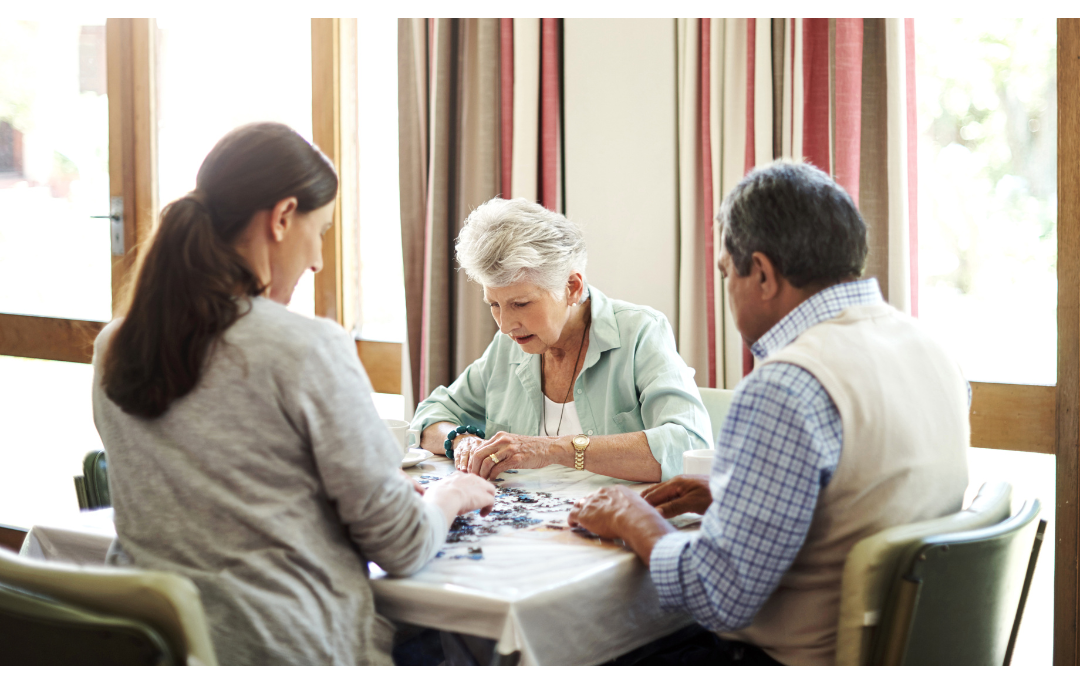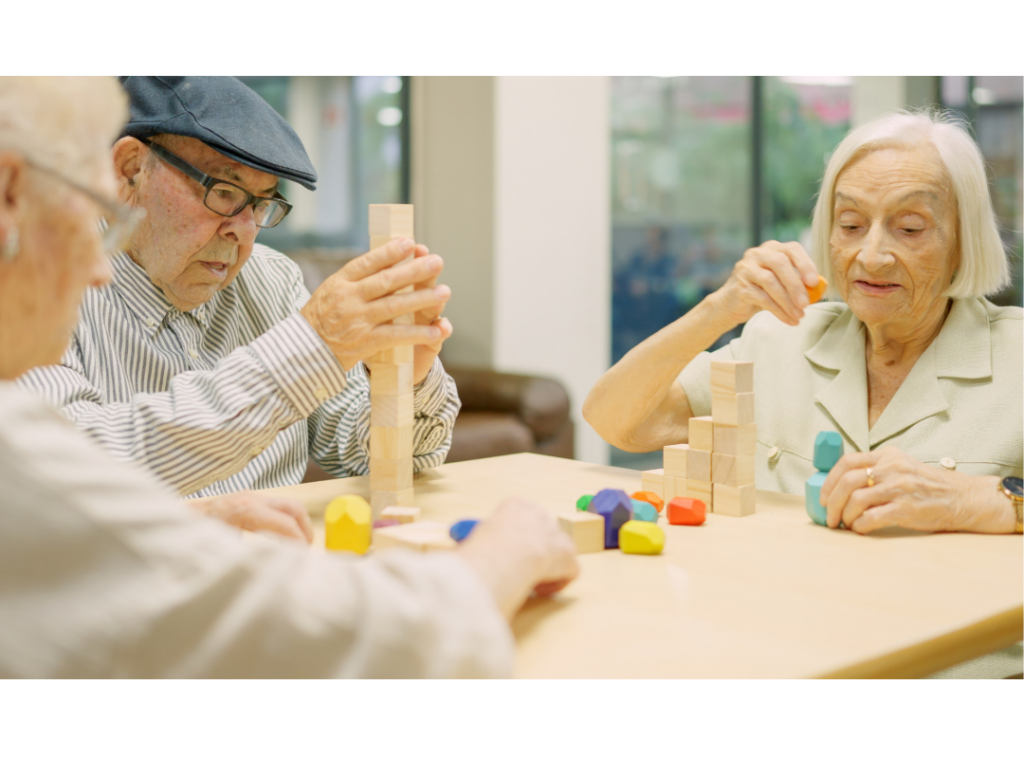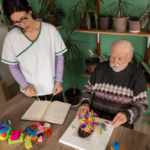Why Memory Exercises for Seniors Are Essential for Healthy Aging
You might not realize it, but engaging in memory exercises can markedly impact your quality of life as you age. At Valley Spring Memory Care, we understand that these activities not only strengthen your cognitive abilities but also foster social connections that are essential for emotional well-being. By incorporating simple yet effective memory techniques into your routine, you can maintain your independence and enhance your overall mental health. But what specific exercises should you consider, and how do they contribute to a healthier aging process? The answers could reshape your approach to aging.
Importance of Memory Exercises
Memory exercises play an essential role in maintaining cognitive health as we age. Engaging in memory exercises for seniors helps strengthen neural connections, which is vital for preserving your mental sharpness.
Whether it’s through puzzles, word games, or simple recall tasks, these activities promote cognitive engagement and can be easily integrated into daily routines. You can also find free brain exercises for memory online, offering a variety of options to keep your mind active without financial strain.
For seniors with dementia, memory exercises can be tailored to meet their needs, focusing on familiar themes and repetitive tasks to encourage emotional connections. These activities not only help in retaining memories but also foster a sense of accomplishment and engagement. It’s important to approach these exercises with empathy, recognizing the challenges faced by those with memory issues. Additionally, incorporating cognitive training into daily activities can further enhance mental sharpness and overall well-being.
Benefits of Cognitive Engagement
Cognitive engagement offers you significant benefits, starting with enhanced mental health and improved memory retention.
Participating in activities that stimulate your mind not only sharpens your memory but also opens up opportunities for social interaction, helping you connect with others.
Embracing these exercises can lead to a more fulfilling and vibrant life as you age. Additionally, engaging in brain-stimulating activities has been shown to improve cognitive function and memory performance.
Mental Health Enhancement
Engaging in mental activities greatly benefits your mental health, especially as you age. Incorporating memory exercises for seniors online can help maintain cognitive function and emotional well-being. Research shows that regular cognitive engagement can reduce the risk of depression and anxiety, fostering a more positive outlook on life.
You might find memory games for seniors free online to be both enjoyable and beneficial. These games not only stimulate your brain but also enhance memory skills, improve attention, and promote better concentration.
By participating in at least 5 brain exercises each week, you can create a routine that nurtures your mental health and keeps your mind sharp. Additionally, these activities are designed based on scientific principles to effectively boost cognitive function and overall well-being.
In addition to the cognitive benefits, these activities provide a sense of accomplishment and independence. They can ignite your creativity and encourage you to explore new interests.
Social Interaction Opportunities
Participating in brain exercises not only sharpens your mental skills but also opens up valuable opportunities for social interaction. Engaging with others through cognitive activities fosters connections that can combat loneliness and enhance your well-being.
Here are some ways these exercises can promote social interactions:
- Group Challenges: Participating in trivia quizzes or word puzzles encourages laughter and teamwork, helping to build strong social bonds.
- Community Events: Joining local bingo nights or game days offers a relaxed atmosphere where everyone can connect over shared interests.
- Collaborative Learning: Learning a new language or engaging in arts and crafts can be done in groups, enhancing both cognitive skills and friendships.
- Technology Groups: Exploring free download memory games for seniors together can open doors to new friendships and shared experiences.
Additionally, engaging in activities that stimulate memory and creativity is a key aspect of engaging in activities for cognitive well-being at facilities such as Valley Spring Memory Care.
Utilizing memory exercises for seniors can provide numerous social opportunities, enriching your life while keeping your mind engaged.
Memory Retention Improvement
One of the most effective ways to boost memory retention is through regular mental engagement. When you challenge your brain with activities like puzzles, trivia, or strategy games, you’re actively stimulating neural pathways, which enhances your cognitive functions. This mental workout not only improves memory but also sharpens concentration and problem-solving skills.
Engaging in these activities can be particularly beneficial as you age. Research shows that consistent cognitive engagement helps maintain and even increase your cognitive reserve, potentially reducing the risk of dementia. It’s not just about memorizing facts; it’s about fostering connections in the brain that enhance overall mental agility.
Additionally, these exercises often encourage social interaction, which further contributes to emotional well-being. Whether you’re playing a game with friends or tackling a puzzle together, the camaraderie can reduce feelings of isolation and promote a sense of community.
Types of Memory Exercises
When it comes to memory exercises, you’ll find a variety of engaging options that cater to different needs and preferences.
Trivia quizzes not only stimulate your mind but also foster social connections, making them a fun way to bond with others.
Additionally, tailored memory games can provide essential support for individuals with dementia, helping enhance their cognitive engagement and improve their quality of life.

Trivia Quizzes Benefits
Trivia quizzes not only provide a fun way to engage your mind, but they also offer numerous cognitive benefits that can enhance your memory and overall mental health.
By participating in trivia quizzes, you can experience a range of positive effects, including:
- Memory Stimulation: Answering questions requires recalling facts and information, which helps strengthen your memory pathways.
- Social Interaction: Quizzes can be played in groups, promoting laughter and connection with others, and reducing feelings of loneliness.
- Mental Agility: The competitive nature of trivia encourages quick thinking and enhances your cognitive processing skills.
- Lifelong Learning: Trivia exposes you to new topics and facts, fostering a love for learning and curiosity that can keep your mind sharp.
Engaging in trivia quizzes not only boosts your cognitive function but also enriches your social life.
Whether you’re playing with friends or family, you’ll find that the shared experience can greatly enhance your mental well-being.
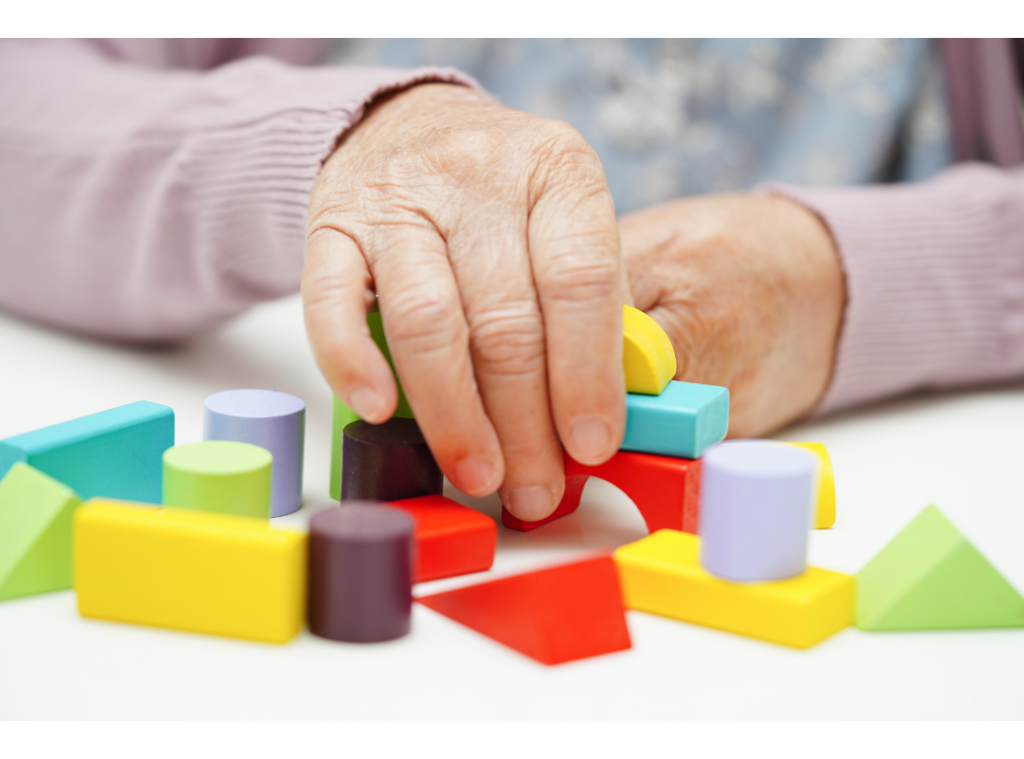
Memory Games for Dementia
Memory games designed for individuals with dementia can greatly improve their cognitive engagement and quality of life. These games focus on simple, repetitive tasks that foster familiarity and comfort, making it easier for loved ones to participate.
Activities like card-matching games enhance recall skills, while trivia quizzes can spark joy and laughter as you explore shared memories.
Board games specifically tailored for dementia, such as Amazing Chase or Animal Snap, encourage social interaction and emotional connection. Engaging in these games not only stimulates cognitive function but also helps slow the progression of dementia.
Shopping list games, where players take turns recalling and adding items, promote conversation and memory skills in a fun, relatable way.
Similarly, tray games involve recalling objects after a quick peek, effectively engaging brain functions while allowing for caregiver support.
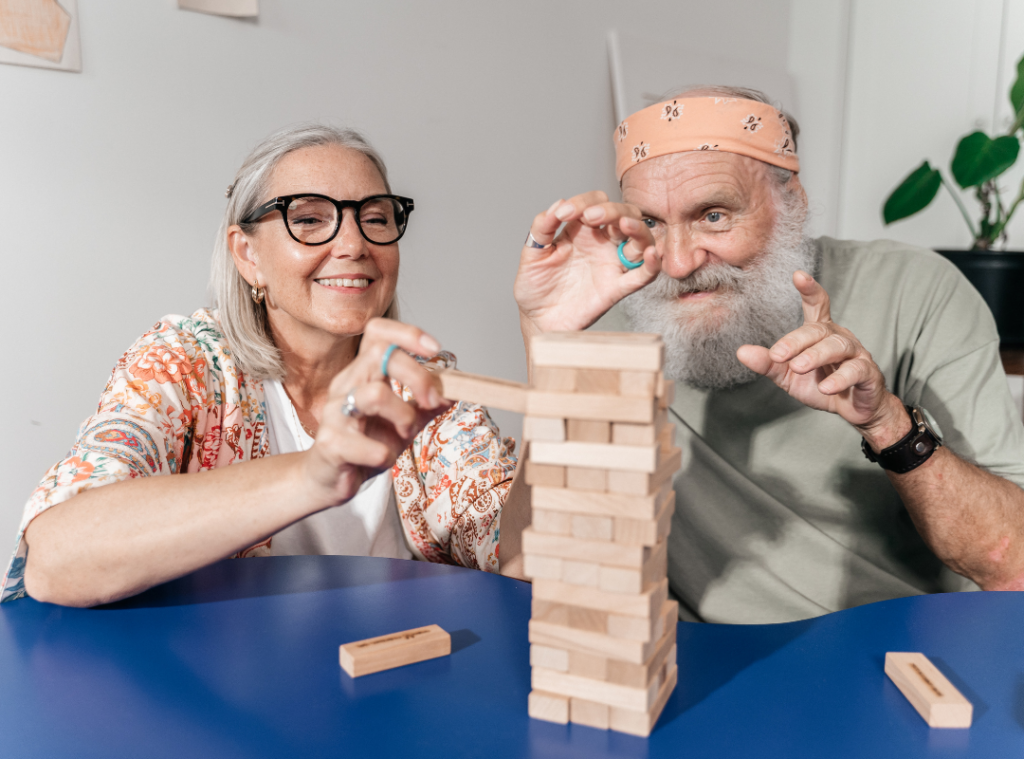
Engaging Social Activities
Engaging in social activities not only strengthens bonds among seniors but also serves as a powerful way to enhance memory and cognitive skills. When you participate in group activities, you stimulate your brain while fostering connections with others.
Here are some impactful options to take into account:
- Trivia Quizzes: Challenge your memory and knowledge with fun quizzes that can be enjoyed alone or in teams, promoting laughter and camaraderie.
- Bingo: This classic game encourages social interaction and keeps you mentally engaged while providing a relaxed atmosphere.
- Arts and Crafts: Get creative! Engaging in artistic activities not only reduces stress but also enhances cognitive function, allowing for personal expression.
- Dance Classes: Join a group class to combine physical movement with cognitive engagement, strengthening both your body and mind while making new friends.
These engaging social activities help combat loneliness and stimulate your cognitive abilities.
Brain Games for Seniors
While aging can bring about challenges in cognitive function, incorporating brain games into your routine can make a significant difference in maintaining mental sharpness and overall well-being. Engaging in activities like trivia quizzes and word puzzles stimulates your memory and boosts concentration.
These games not only challenge your mind but also provide a fun way to connect with others, whether you’re playing in a group or solo. Logic and strategy games, such as Sudoku or chess, strengthen your reasoning skills and enhance cognitive engagement. They encourage you to think critically while offering a sense of accomplishment.
Similarly, memory games, like card matching, are enjoyable ways to improve recall and observational skills. Moreover, arts and crafts can stimulate creativity while engaging both sides of your brain. Each of these activities can be tailored to fit your abilities, ensuring everyone can participate and benefit.
Social Interaction and Memory
Social interactions play a significant role in enhancing memory and cognitive function, especially for seniors. Engaging in social activities not only boosts your mood but also helps strengthen your brain.
Here are four ways social interaction can positively impact your memory:
- Cognitive Stimulation: Conversations and group activities challenge your brain, keeping it agile and sharp.
- Emotional Support: Sharing experiences with others reduces stress and anxiety, which can negatively affect memory.
- Sense of Belonging: Participating in social events fosters connections, combating loneliness and encouraging mental engagement.
- Shared Learning: Group settings allow for the exchange of knowledge and ideas, enhancing your cognitive skills and memory retention.
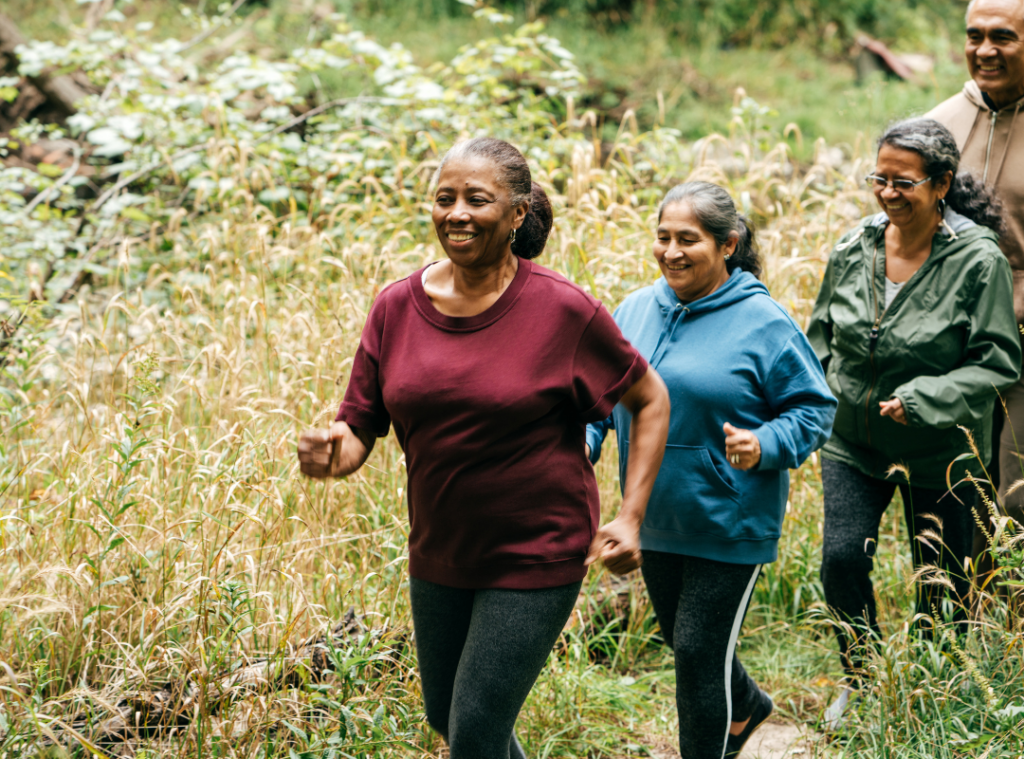
Outdoor Activities and Brain Health
Numerous studies highlight the profound impact outdoor activities can have on brain health, particularly for seniors. Engaging in fresh air and nature not only boosts your mood but also enhances cognitive functions. Whether it’s walking in a park or gardening, these activities stimulate your senses and promote social interactions, which are essential for mental well-being.
Here’s a quick look at some outdoor activities and their benefits:
| Activity | Brain Benefits | Social Aspect |
| Walking | Improves memory and cognitive flexibility | Encourages companionship |
| Gardening | Enhances focus and reduces stress | Fosters community connections |
| Dancing | Boosts coordination and cognitive agility | Builds friendships through classes |
| Birdwatching | Stimulates observational skills | Group outings promote bonding |
Arts and Crafts for Cognitive Skills
Engaging in arts and crafts offers a unique way to enhance cognitive skills while also promoting creativity and self-expression. By participating in these activities, you can stimulate your mind and enjoy the process of creating something meaningful.
Here are some benefits you might experience:
- Brain Engagement: Art activities engage both hemispheres of your brain, fostering connections between different cognitive functions.
- Stress Reduction: Crafting can greatly lower stress levels, allowing you to focus on the present moment and enjoy the creative process.
- Memory Improvement: Research shows a 73% reduction in memory and thinking issues among those who regularly engage in creative activities.
- Dexterity Maintenance: Working with your hands through various crafts helps maintain fine motor skills, which are vital for daily tasks.
Learning New Skills
Learning new skills can be a rewarding way to keep your mind sharp and enhance your overall cognitive health. Engaging in activities like learning a new language, picking up an instrument, or even joining a cooking class can stimulate your brain and foster neuroplasticity. Research shows that these challenges can build cognitive reserve, helping to maintain memory and problem-solving abilities as you age.
Moreover, learning new skills often involves social interaction, whether through group classes or shared interests. This connection not only combats feelings of isolation but also provides a sense of belonging. When you learn something new, you’re not just enhancing your knowledge; you’re also contributing to your community by sharing your skills with others.
Additionally, the process of learning can be incredibly fulfilling. It fosters a sense of accomplishment and boosts your self-esteem.
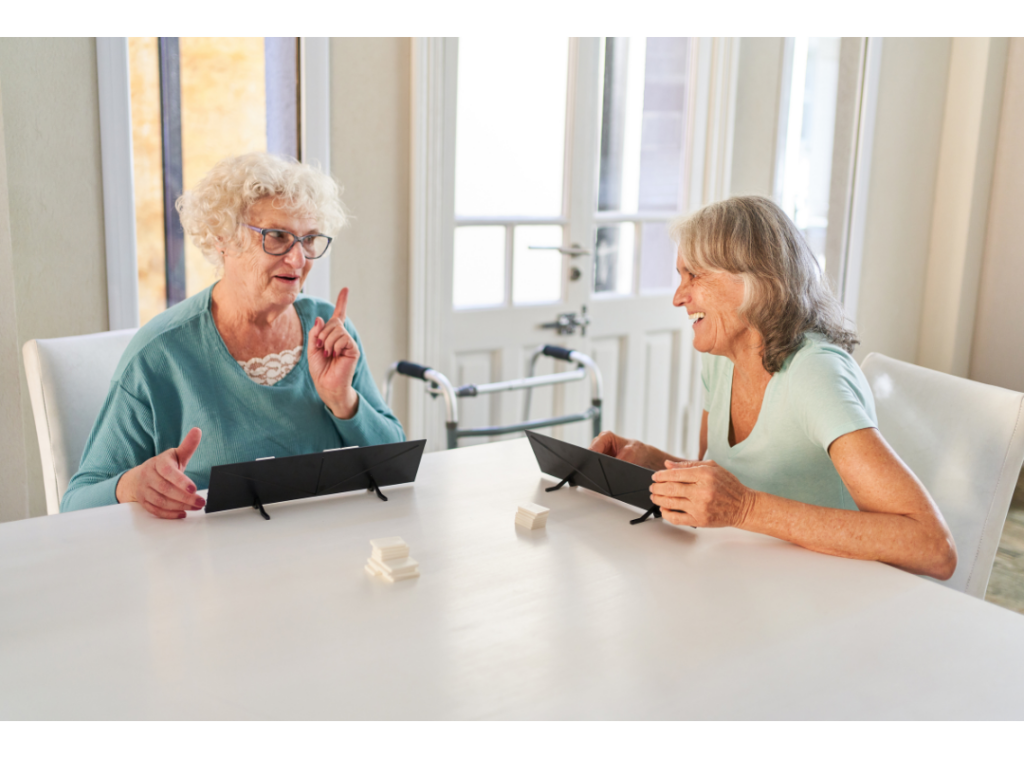
Technology and Memory Training
In today’s digital age, technology can greatly enhance your memory training efforts, making cognitive engagement more accessible and enjoyable. By incorporating various tech tools, you can stimulate your mind while connecting with others.
Here are some effective ways to leverage technology for memory training:
- Brain Training Apps: Numerous apps provide tailored activities that boost your memory and concentration, allowing you to train anywhere.
- Online Games: Engage in multiplayer games that challenge your cognitive skills while fostering social interaction, making the experience both fun and beneficial.
- Virtual Classes: Participate in online courses that introduce new skills, encouraging mental agility and lifelong learning, which is essential for brain health.
- E-books and Audiobooks: Immerse yourself in stories that challenge your comprehension and recall, whether you’re reading or listening, making literature an interactive experience.
Embrace these technological advancements to not only enhance your memory but also to foster connections with others in your community.
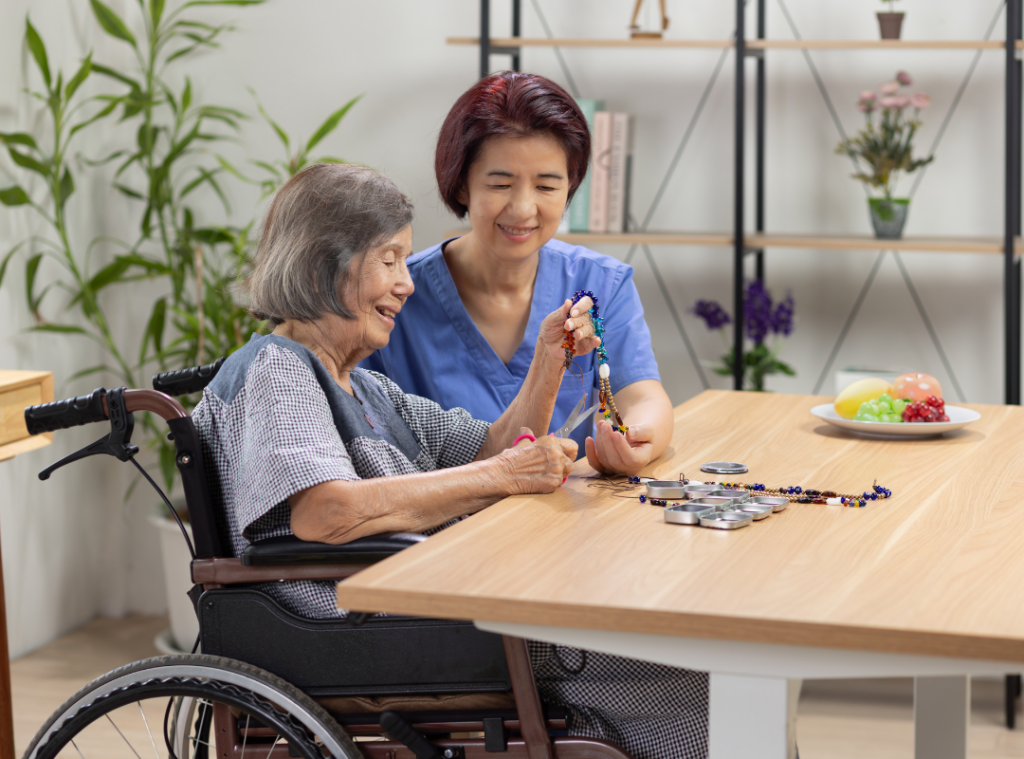
Creating a Memory-Friendly Environment
Creating a memory-friendly environment starts with organizing your living space to minimize distractions and enhance focus.
Utilizing memory aids, like calendars and labels, can help you keep track of important tasks and appointments.
Encouraging routine activities not only fosters familiarity but also strengthens your memory over time.
Organizing Living Spaces
A well-organized living space can considerably enhance memory and cognitive function for seniors. When you create a memory-friendly environment, you set the stage for improved focus and reduced frustration.
Here’s how you can effectively organize living spaces:
- Declutter: Remove unnecessary items to create a calm atmosphere. Fewer distractions help maintain attention and clarity.
- Label: Use clear labels on drawers, cabinets, and shelves. This makes it easier to find items, reducing confusion and fostering independence.
- Consistent Placement: Keep frequently used items in the same spot. Consistency helps reinforce memory through repetition, making daily tasks smoother.
- Visual Cues: Incorporate meaningful photographs or artwork. These can stimulate memories and provide comforting connections to the past.
Utilizing Memory Aids
An organized living space lays the groundwork for utilizing memory aids that can enhance daily functioning for seniors. By creating a memory-friendly environment, you’re not just reducing clutter but also supporting cognitive health. Simple strategies can make a significant difference.
For instance, use labels on cabinets and drawers to help seniors easily locate everyday items. Color-coded systems can also simplify navigation, making it easier to remember where things belong.
Incorporating visual reminders, like calendars or sticky notes, can be effective memory aids. Placing these in high-traffic areas helps seniors track appointments and important tasks. Likewise, a consistent layout for furniture and belongings fosters familiarity, reducing confusion.
Encouraging the use of memory aids isn’t just about organization; it’s about empowerment. When seniors can easily find their belongings and remember daily tasks, it boosts their confidence and independence.
Encouraging Routine Activities
Establishing a routine can greatly benefit seniors by enhancing their memory and cognitive function. A consistent daily structure not only promotes familiarity but also reduces anxiety and confusion.
To create a memory-friendly environment, consider incorporating these routine activities:
- Morning Rituals: Start each day with simple exercises like stretching or a short walk to invigorate both the body and mind.
- Meal Preparation: Involve seniors in planning and preparing meals, which can stimulate cognitive engagement and foster a sense of accomplishment.
- Memory Games: Dedicate time each week for memory-boosting activities, such as puzzles or trivia, to enhance cognitive skills while having fun.
- Social Interactions: Schedule regular visits with family or friends, encouraging meaningful conversations that stimulate memory recall and emotional connections.
Incorporating memory exercises into your daily routine isn’t just beneficial; it’s a chance to rediscover joy and connection. At Valley Spring Memory Care, we encourage you to engage in puzzles or share stories with friends, as you’ll find that these moments not only enhance your cognitive skills but also enrich your life. Coincidentally, you’re also nurturing relationships and well-being by fostering your memory. Embrace these activities to empower your mind, and you’ll likely discover a newfound sense of independence and fulfillment in your golden years. For more information or support, feel free to contact us at 209-710-4783.
Frequently Asked Questions
How Often Should Seniors Practice Memory Exercises?
You should practice memory exercises several times a week. Consistent engagement, even for just 10-15 minutes daily, can considerably enhance cognitive function, boost memory skills, and promote overall mental well-being. Enjoy the journey!
Are There Any Risks Associated With Memory Exercises for Seniors?
While memory exercises are generally safe, some seniors might experience frustration or fatigue. It’s important to tailor activities to individual abilities and provide breaks, ensuring a supportive environment that encourages enjoyment and engagement without overwhelming them.
Can Memory Exercises Improve Quality of Life for Seniors?
Imagine a vibrant garden where each memory exercise is a seed. As you nurture these seeds, they bloom into joyful experiences, enhancing your quality of life by sharpening your mind, fostering connections, and promoting overall well-being.
What Age Is Ideal to Start Memory Exercises?
You can start memory exercises at any age, but beginning in your 40s or 50s helps maintain cognitive health. Early engagement fosters neuroplasticity and strengthens your brain’s resilience against memory decline as you age.
How Do I Choose the Right Memory Exercise for My Loved One?
“You can’t choose a book by its cover.” To pick the right memory exercise for your loved one, consider their interests, abilities, and preferences. Tailor activities to engage them while ensuring enjoyment and cognitive stimulation.



